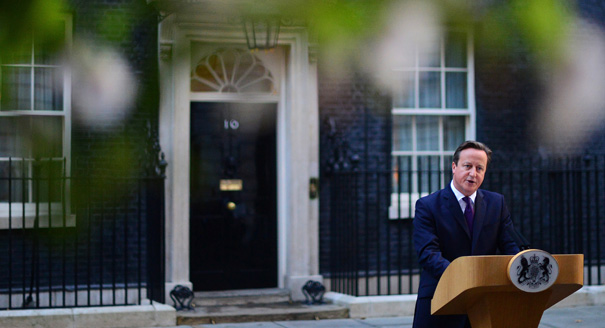Cameron gets this enormous chance despite the fact that he gravely miscalculated the Scottish referendum question, bungled the UK’s Europe policies (that other issue revolving around political union), and contributed very little to the victory of the Scottish No campaign.
With luck being so massively on his side, Cameron can now do what few democratically elected leaders are ever given the chance to: fundamentally reshape the political landscape of a country toward a more modern design.
Decentralization, parliamentary reform, tax and fiscal reform, electoral reform—all of these changes will have to be implemented at rapid speed and will give Cameron the opportunity to
transform Britain more dramatically than Margaret Thatcher could have ever dreamed.
Along the way, Cameron can demonstrate to the rest of Europe what modern state reform looks like. He can bring about a rejuvenation that the country desperately needs by inspiring citizens at the local and regional levels with greater powers and responsibilities. Those who have traveled to small and medium sized towns in England, Scotland, or Wales in recent years will know how desperately these locals need an infusion of civic spirit and communitarian enthusiasm.
If played well, Cameron can create a period of “Cool Britannia II.” Only this time, it could have some real substance to it, as opposed to the empty Blairite babble of the late 1990s.
The window of opportunity is small. The current economic upswing in the UK looks positive, but remains fragile. The super-grand coalition of the “Better Together” campaign will only feel bound by the promises given to Scotland for a short time. Already, Tory backbenchers are questioning the “devo max” policy.
Yet, if Cameron manages to sustain this “Better Together” spirit over the coming months, uses the reform project to finally get a grip on the backbenchers in his party, and devises a bold and smart idea for what a federally structured UK might look like, he could go down in history.
Cameron has been given an unexpected opportunity to become one of the truly great British prime ministers. He could carry this energy into the 2015 UK general elections and win them, marginalizing his Labour opponents in the process. Best of all, he could regain a leadership status within his own party that would make him a lot less vulnerable to attack from the euroskeptic radicals who wish to unseat him and lead the UK into the political wilderness.
Not least, Cameron could improve his tarnished reputation in Europe, walk into EU negotiations with a strong mandate (similar to the one that Italian Prime Minister Matteo Renzi currently enjoys), and face a 2017 referendum on the UK’s EU membership with confidence—and an arsenal of good arguments for staying in. If Cameron manages to win two existential referenda in the UK, a place in the history books will surely be his.
All of this now depends on whether Cameron has the instinct, the strength, the forcefulness, and the skill to bring about meaningful constitutional change to the UK in the next few months.
History has given David Cameron a seductive smile today. He now needs to show that he can conquer her.











